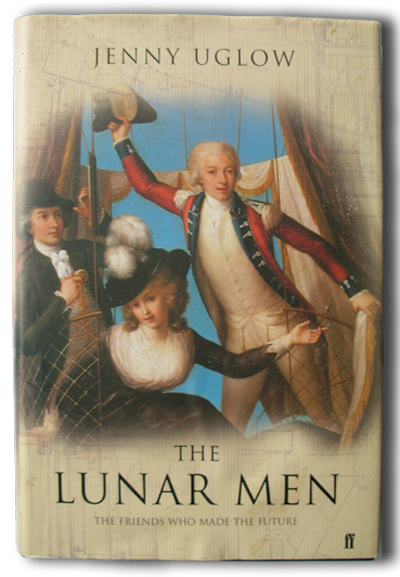On the 4th of October, the Dr Johnson Bookclub met again after their summer break. There was much happy helloing, how-you-doing and what’ve-you-been-up-to-ing. We’d met up to discuss ‘The Lunar Men’ by Jenny Uglow. Many members had been on the trip in July to Lichfield to visit Johnson’s hometown and birthplace but also to explore Erasmus Darwin’s house and museum. (I’d visited it earlier in the year and can read my write up here). This recent visit meant that some of the locations in the book were fresh in our minds and informed our discussions.
The praises for this book were effusive. Not everyone had got through it, and all agreed it was a much longer, denser book then they first imagined. It tells a joint biography of seven or so men who met in each others houses to discuss whatever was on their minds, usually topics of a scientific bent and who thus found themselves at the forefront of pretty much every forward-looking and modern discovery of the late eighteenth century.
To list some of the achievements of the Lunar Society is something which is almost unbelievable; canal building, efficient steam engines, huge leaps in carriage technology; theories of tectonic plates, hot and cold weather fronts, evolution and technological standardisation - the pottery of Wedgewood, machines that spoke, the discovery of oxygen as well as huge experiments in social organisation, education, freedom of knowledge and knowledge of freedom. The book has to be recommended purely for the sheer amount of exploration and ingenuity the group had some major role in furthering.
Add to that, Jenny Uglow had the ability to explain all of the technical and scientific information in ways that had a room full of arts students feeling that they could understand it. Rarely has a book allowed a group of old-book nerds talk with relative authority on the theories of de-phlogisticated air. For an evening, we all became natural philosophers if not actually scientists. As George Elliot said about science in Middlemarch, ‘It leads to everything; you can let nothing alone’.
This was partly because of the clarity of the book, but partly because of the style of the Lunar Men themselves. They saw no knowledge as barred to them, they allowed their curiosity to wander over every spectrum, often blurring art, science and industry into one gigantic exploration. There was much lamenting over the compartmentalisation of knowledge in modern academic and research centres which may have impeded the serendipitous acquisition of knowledge because the focus is always so narrow.
We discussed if groups such as the Lunar Society could ever happen today. Whether it is possible to have that cross fertilisation of knowledge, whether you need a Darwin figure spinning ideas out to the rest of the group, a Dr Small healing the fractures. We also revelled in the Not-London element of it all. How these men, many of them dissenters and outside of the Oxbridge system, created an intellectual haven away from the strictures of London life. There was something gleeful in celebrating Birmingham and Derby, Glasgow and Truro - a reminder that not everything that happened in the eighteenth century took place under the sound of Bow Bells.
There was also a fondness for the warmth of the book. We did not merely have cold scientists and industrialists, we has people. There was optimistic Boulton in partnership with pessimistic Watt; careful experimentalist Wedgwood and haphazard Priestley, inventive Darwin and conservative Withering - with Edgeworth and Day circling round and providing strange anecdotes and hundreds of children.
We also thrilled in the book to see the Lunar Men grow up, marry some Lunar Women and have Lunar babies. We grew to know the families, see them study together, play together and at times, die in each other’s company. We had the daft details as well as the big story - whether that be outdoing each other in ludicrous carriages, keeping sheds of skinned horses, dealing with a man who had a bed made of iron or wading in the garden pond to catch gas but catching a cold instead.
We also wondered why a group of men could get canals built in under ten years with their own money, PR skills and charm but Westminster can’t complete HS2 until the forever future.
It was an excited and breathless discussion, with voices pinging from all sides of the room, many fighting to join in - and that has to be the sign of a provocative and informative book.
As often happens, I was more enlivened by the discussion then the book, which tilted a little too much on the industrial/technical side for my taste - but a very good book which told me a little more than I wanted to know about some extraordinary people.


